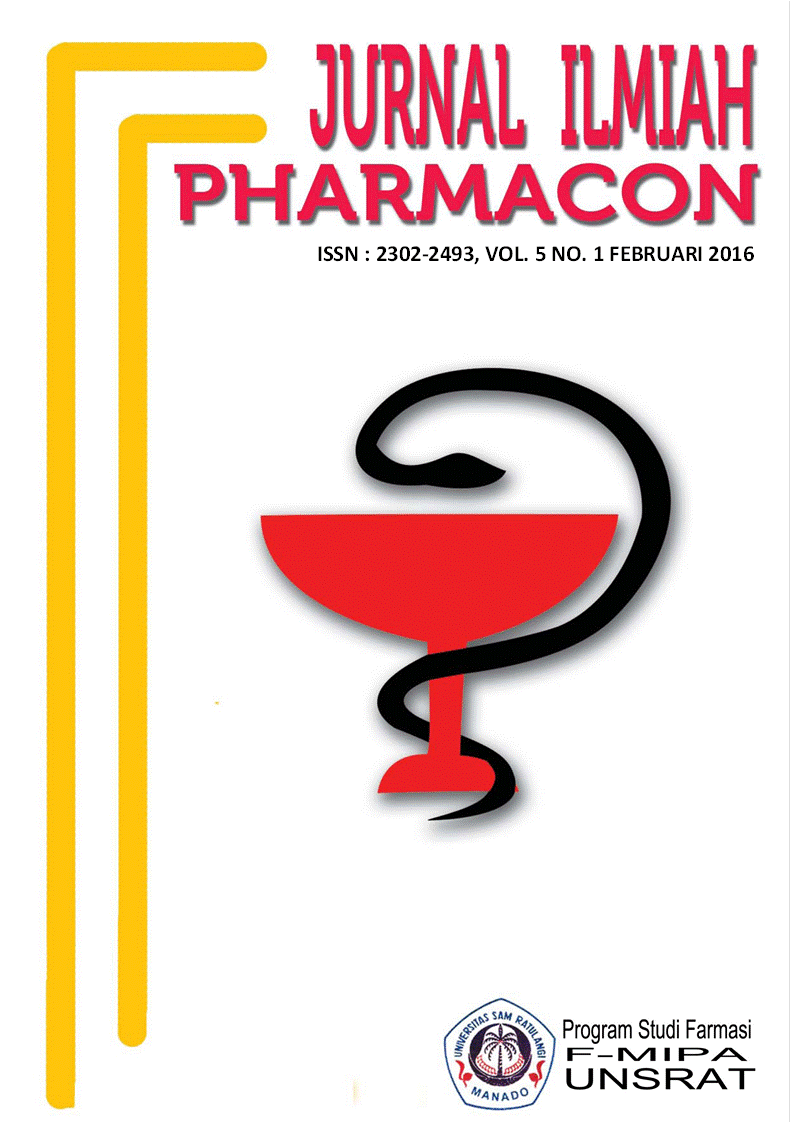EFEKTIVITAS EKSTRAK DAUN JAMBU MAWAR (Syzigium jambos L. alston) MENGHAMBAT PERTUMBUHAN Streptococcus mutans SECARA IN VITRO
DOI:
https://doi.org/10.35799/pha.5.2016.11224Abstract
EFEKTIVITAS EKSTRAK DAUN JAMBU MAWAR (Syzigium jambos L. alston) MENGHAMBAT PERTUMBUHAN Streptococcus mutans SECARA IN VITRO
Patricia Mamahit1), Jane Wuisan1), P.S Anindita1)
1)Program Studi Pendidikan Dokter gigi Fakultas Kedokteran UNSRAT
ABSTRACT
Â
The Rose Apple (Syzygium Jambos L. Alston) is an Indonesia’s natural substance which has been known only as an ornamental plant but have medicinal properties. Leaves of syzygium jambos contain some antibacterial compounds including flavonoids and tannins. Streptococcus mutans is a bacteria that causes dental caries and has the ability to produce the acidic in the oral cavity. An alternative way to cope Streptococcus mutans is by using leaves of syzygium jambos.The purpose of this study is to determine whether the extract of syzygium jambos leaf is effective to inhibit the growth of Streptococcus mutans which was seen from the inhibition zone.This study was an experimental research by using a modified Kirby-bauer method with filter paper. Syzygium jambos leaf samples were taken from Paslaten, East of Tomohon, Tomohon. The syzygium jambos’s leaf was extracted with maceration method by using ethanol 96%. Streptococcus mutans bacteria was taken from a pure bacteria stock in the Laboratory of Sam Ratulangi University.The result on this research is Inhibition zone of leaf extract against Streptococcus mutans are about 13.15 mm, it can be concluded that the extract of syzygium jambos leaf is effective to obstract the growth of Streptococcus mutans bacteria
Key words: Rosses apple leaf (Syzigium jambos L. Alston), Streptococcus mutans, . Inhibition zone
ABSTRAK
Tanaman jambu mawar (Syzigium Jambos L. Alston) merupakan bahan alami Indonesia yang selama ini hanya dikenal sebagai tanaman hias tetapi memiliki khasiat obat. Daun jambu mawar mengandung beberapa senyawa antibakteri antara lain flavonoid dan tannin. Streptococcus mutans merupakan bakteri penyebab karies gigi dan memiliki kemampuan menghasilkan suasana asam dalam rongga mulut. Cara alternatif untuk menanggulangi Streptococcus mutans yaitu dengan menggunakan daun jambu mawar.Tujuan penelitian ini untuk mengetahui apakah ekstrak daun jambu mawar efektif untuk menghambat pertumbuhan bakteri Streptococcus mutans dilihat dari zona hambat. Penelitian ini merupakan penelitian eksperimental dengan metode modifikasi Kirby-bauer menggunakan kertas saring. Sampel daun jambu mawar diambil dari Kelurahan Paslaten 2 Kecamatan Tomohon Timur, Kota Tomohon. Daun jambu mawar kemudian diekstraksi dengan metode maserasi menggunakan pelarut etanol 96%. Bakteri Streptococcus mutans diambil dari stok bakteri murni Laboratorium FMIPA Universitas Sam Ratulangi Manado. Hasil penelitian didapatkan zona hambat ekstrak daun jambu mawar terhadap bakteri Streptococcus mutans sebesar 13,15 mm, dari penelitian ini dapat disimpulkan bahwa ekstrak daun jambu mawar efektif dalam menghambat pertumbuhan bakteri Streptococcus mutans.
Â
Kata kunci: daun jambu mawar (Syzigium jambos L. Alston), Streptococcus mutans, zona hambat
Â
Downloads
Published
How to Cite
Issue
Section
License
Authors who publish with this journal agree to the following terms:
- Authors retain copyright and grant the journal right of first publication with the work simultaneously licensed under a Creative Commons Attribution-NonCommercial 4.0 International License that allows others to share the work with an acknowledgement of the work's authorship and initial publication in this journal.
- Authors are permitted and encouraged to post their work online (e.g., in institutional repositories or on their website) prior to and during the submission process, as it can lead to productive exchanges, as well as earlier and greater citation of published work (See The Effect of Open Access)










